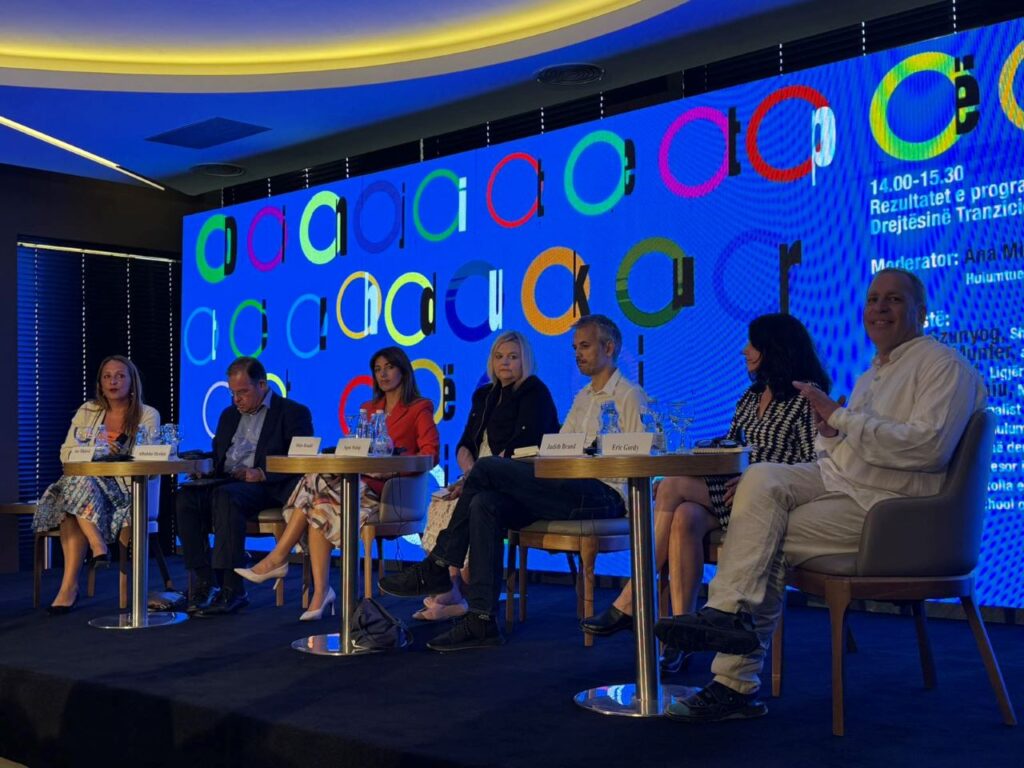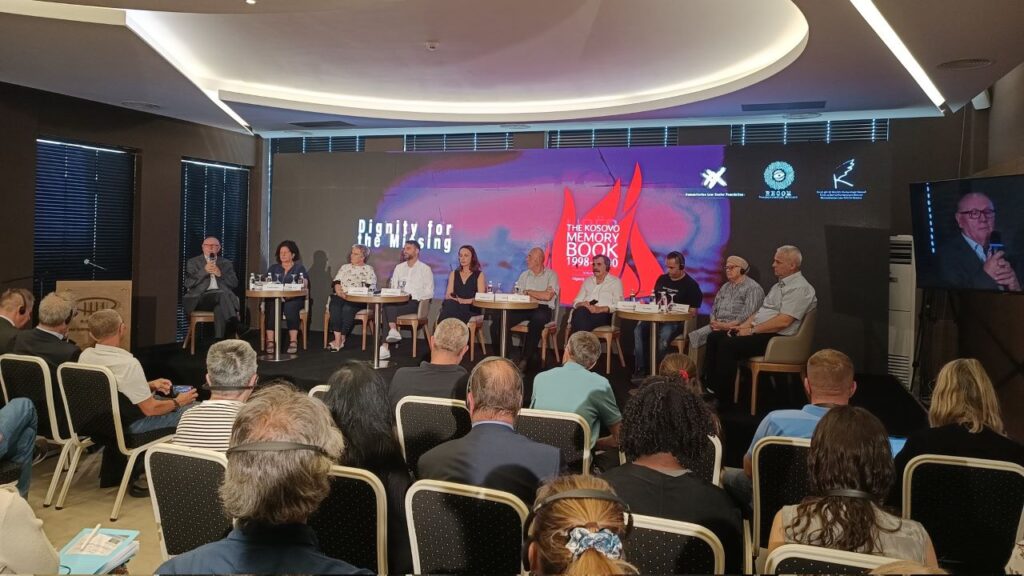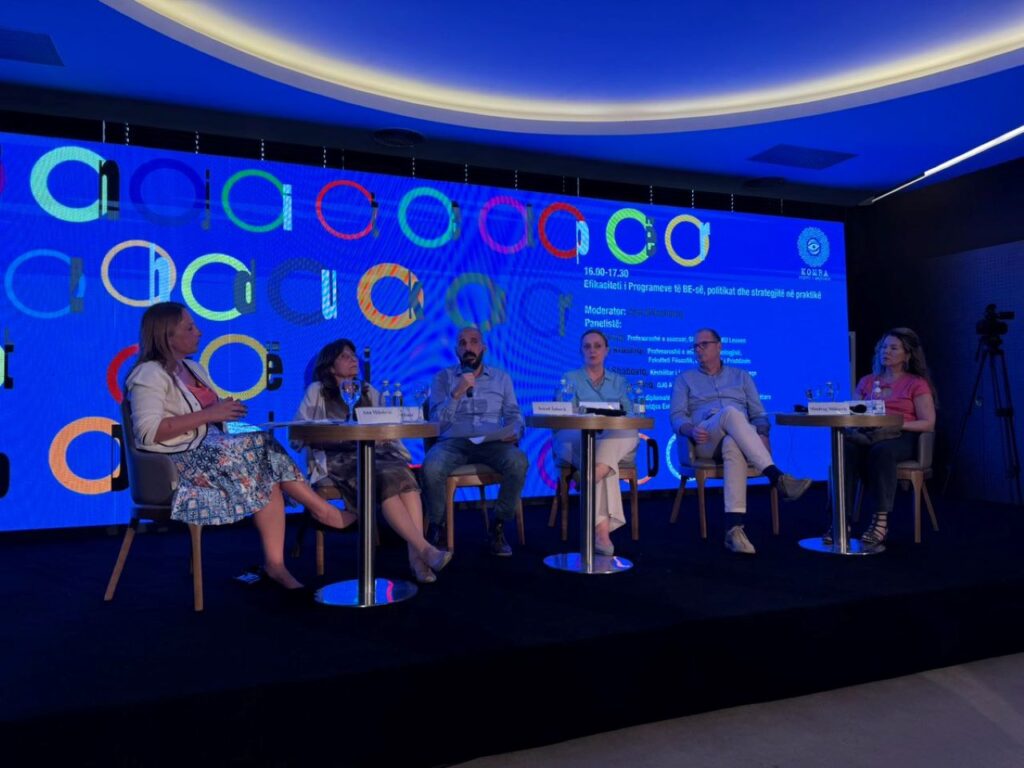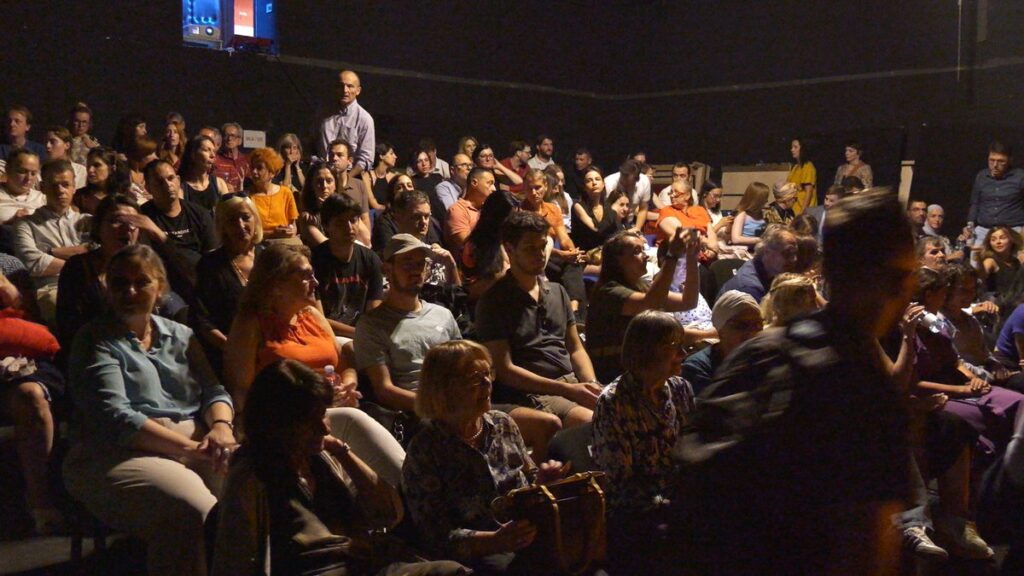Within the RECOM Reconciliation Network, the 16th Forum for Transitional Justice in Post-Yugoslav Countries began in Pristina, organized by the Humanitarian Law Center and the Humanitarian Law Center Kosovo, in partnership with organizations among which also Centre for Civic Education (CGO) from Montenegro, and supported by the European Union. The first day included thematic panels, testimonies from victims’ families, and the promotion of the “Kosovo Memory Book (1998-2000).”
The second edition of the “Kosovo Memory Book (1998-2000)” was presented by Nataša Kandić, founder of the Humanitarian Law Center, who stated that the publication provides insight into the diverse and painful circumstances of those who went missing during the conflict in Kosovo. It includes cases of individuals forcibly taken from their homes and fields, as well as those from refugee columns leaving the country. The book lists all documented cases from all ethnic groups, including over 70 minors and over 200 individuals over the age of 70. Blood samples for DNA identification have not yet been collected for over 150 missing persons, and for more than 50, there are insufficient samples. The International Committee of the Red Cross (ICRC) records 1,613 missing persons in the conflict, while the Humanitarian Law Center lists an additional 23 missing persons, totalling 1,636 individuals. Of that number, 1,400 were civilians or not involved in fighting, resistance, or arming during the conflict. The book is based on over 2,000 statements obtained with the families’ consent, supplemented by more than 1,500 additional reports, comparisons with court documents, open sources, and databases of the ICRC and the International Commission on Missing Persons (ICMP).
At the Forum, opening remarks were made by the Special Representative of Norway for the Western Balkans, Ambassador Haakon Blankenborg, and the EU Special Representative for Kosovo, Tomáš Szunyog.
Blankenborg emphasized that Western Balkan societies must “challenge their comfort zones” and stop using missing persons as “political bargaining chips,” and that “impunity and uncertainty can never be a long-term solution.” He also highlighted that organizations like the HLC and the HLC Kosovo had to step in when governments delayed progress with “tactics and political assessments” on the most basic issues, including revealing the numbers and locations of missing persons.
Szunyog commended the efforts of organizations in transitional justice, such as the HLC and the HLC Kosovo, in “helping victims and their families find closure.”
Former Kosovo President Atifete Jahjaga delivered an emotional speech about open wounds in Western Balkan societies due to the unresolved fate of missing persons, emphasizing the lack of “political will, especially from Serbia, to cooperate on the review and exhumation of mass graves.” She stressed that “justice is a prerequisite for sustainable peace.”
During the first panel, members of the families of the missing and killed spoke.
Petrit Hasanaj, one of them, shared his experience of losing family members in the Meja massacre, which occurred in April 1999. “I was a student in Pristina while my family was in Meja. My father told me to stay in the capital. I was confused why he didn’t want to see me… The next time I saw him was in a coffin. Staying in Pristina saved my life,” he said.
Mejra Dautović noted that her children never knew or cared about the ethnic differences among their friends. “My Edna was raped and tortured for 60 days in Omarska. Edin was killed in the ‘White House’… After years of searching and testifying, I buried both of my children. I’m grateful to the Humanitarian Law Center, which enabled me to attend the trials and look my child’s killer in the eye,” represents part of her moving story.
Budimir Maslav returned to Kosovo and persistently searched for years to find his sister’s remains to give her a proper burial. “She believed she was safe because she had never done anything wrong to anyone… I still have no official information, and what I learned indirectly is that she was raped, killed, and thrown behind a house that was then burned…” he testified.
The second panel focused on what institutions are doing to address the issue of missing persons and the challenges faced over the years. Luigj Ndou from the ICMP described the issue of missing persons as a “transgenerational curse that we are not healthy enough to break and move forward.”
Panelists also highlighted the problem of mistakes in identifications made by traditional methods without DNA. Ditor Haliti from the Kosovo Forensic Institute noted that “many unidentified remains have been sent to the ICMP but do not match the blood samples on file.”
Luisa Maria De Oliveira Marinho from the EULEX Forensic Team explained that, despite doubts, “many traditional identifications were later confirmed to be accurate based on DNA.” EULEX, she emphasized, is committed to reviewing past cases of mistaken identifications to provide families with complete information.
The third panel addressed the results of programmes, policies, and strategies on transitional justice in the context of European integration, bringing together panellists from EU institutions, officials from Kosovo, analysts, and university professors.
Kosovo Minister of Justice, Albulena Haxhiu, spoke about the recently adopted strategy on transitional justice. “Since I became minister, there has been no other document more complex to draft,” she said, explaining that Kosovo “initiated prosecutions of war criminals in absentia because Serbia refuses to extradite its war criminals and continues to harbour them,” comparing it to similar laws in other countries in the region, such as Croatia.
Analyst Agon Maliqi stated that the region is attempting to replicate the efforts of the West in post-World War II Germany, but that this is a misguided approach. “World War II ended with a clear winner and a clear perpetrator who underwent a deep introspective process, while here we continue to see revisionism and denial,” he said.
Eric Gordy, a professor at University College London and an expert on the Balkans, argued that the process has not fully taken root in the region because it “occurred in relatively closed circles, international circles, with states outside the region or only some states in the region, and rarely any civil society organizations – so society was excluded.”
Judith Brand, a researcher on transitional justice and the Western Balkans, stated that she has become allergic to the use of the word “reconciliation” by international actors, noting that it shifts the responsibility onto individuals and societies.
A separate panel explored the effectiveness of EU efforts in the field of transitional justice and the issue of missing persons. Jelena Minić, a member of the Forum for International Relations of the European Movement in Serbia, emphasized the need for stoicism and openness. “We need to reach a point where we calmly and openly, without fanfare and flags, admit to all the crimes committed.”
Miodrag Milićević from the NGO Aktiv reflected on the recent decline in relations between Serbs and Albanians. “We are in a vicious cycle, and no one can offer a concrete model to get out of the slump in relations,” he said.
Participants at the end of the first working day had the opportunity to watch the play “Father and Father,” directed by Kushtrim Koliqi, which was supposed to be part of the “Mirëdita, Dobar Dan” festival in Belgrade, which was banned by the Ministry of the Interior of the Republic of Serbia in June.




